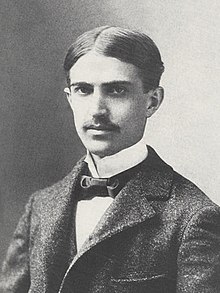Stephen Crane (November 1, 1871 – June 5, 1900) was an American author. He wrote notable works in the Realist tradition as well as early examples of American Naturalism and Impressionism. He is recognized by modern critics as one of the most innovative writers of his generation.
The eighth surviving child of Protestant Methodist parents, Crane began writing at the age of four and had published several articles by the age of 16. Having little interest in university studies, he left college in 1891 to work as a reporter and writer. Crane's first novel was the 1893 Bowery tale “Maggie: A Girl of the Streets”, generally considered by critics to be the first work of American literary Naturalism. He won international acclaim in 1895 for his Civil War novel “The Red Badge of Courage”, which he wrote without having any battle experience. Plagued by financial difficulties and ill health, Crane died of tuberculosis in a Black Forest sanatorium in Germany at the age of 28.
Stephen Crane's fiction is typically categorized as representative of Naturalism, American realism, Impressionism or a mixture of the three. Crane's work, however, cannot be determined by style solely on chronology. Not only does his fiction not take place in any particular region with similar characters, but it varies from serious in tone to reportorial writing and light fiction. The novels and short stories contain poetic characteristics such as shorthand prose, suggestibility, shifts in perspective and ellipses between and within sentences. Similarly, omission plays a large part in Crane's work; the names of his protagonists are not commonly used and sometimes they are not named at all.
Crane is also known for his poetry, journalism, and short stories such as "The Open Boat", "The Blue Hotel", "The Bride Comes to Yellow Sky", and “The Monster”.
The eighth surviving child of Protestant Methodist parents, Crane began writing at the age of four and had published several articles by the age of 16. Having little interest in university studies, he left college in 1891 to work as a reporter and writer. Crane's first novel was the 1893 Bowery tale “Maggie: A Girl of the Streets”, generally considered by critics to be the first work of American literary Naturalism. He won international acclaim in 1895 for his Civil War novel “The Red Badge of Courage”, which he wrote without having any battle experience. Plagued by financial difficulties and ill health, Crane died of tuberculosis in a Black Forest sanatorium in Germany at the age of 28.
Stephen Crane's fiction is typically categorized as representative of Naturalism, American realism, Impressionism or a mixture of the three. Crane's work, however, cannot be determined by style solely on chronology. Not only does his fiction not take place in any particular region with similar characters, but it varies from serious in tone to reportorial writing and light fiction. The novels and short stories contain poetic characteristics such as shorthand prose, suggestibility, shifts in perspective and ellipses between and within sentences. Similarly, omission plays a large part in Crane's work; the names of his protagonists are not commonly used and sometimes they are not named at all.
Crane is also known for his poetry, journalism, and short stories such as "The Open Boat", "The Blue Hotel", "The Bride Comes to Yellow Sky", and “The Monster”.

Комментариев нет:
Отправить комментарий